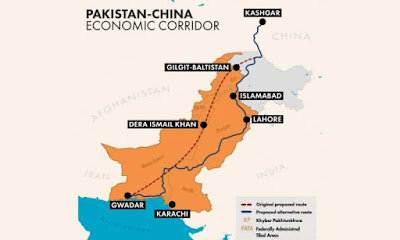Sino-Pak relations are laid on the foundations of an historical friendship based on the need and desire of mutual well being and entwined national interests of both countries. The Pakistani government, led by General Pervaiz Musharraf started marketing the idea of a China Pakistan Economic Corridor (CPEC) to the Chinese in 2004. Musharraf proposed the development and use of the Gawader deep sea port in Pakistan by China and proposed to link it through the existing land route via the Karakorum highway to mainland China. The idea was bought by the Chinese due to it being the most accessible and shortest possible route for the energy hungry Chinese economy to the Middle Eastern oil market. Over time, subsequent Pakistani governments kept on pursuing the development of this corridor even negating US pressure. It was largely made possible by the popular support the Chinese enjoy in Pakistan and similar enthusiasm for Pakistan within China.

THE NEW SILK ROUTE
The change of leadership in China, with President Xi Jinping came into power on 15 November 2012 was faced with the immediate challenge to revive the Chinese economy suffering from the global economic crisis and slow domestic growth rate. President Xi, gained huge public support due to his policies and reforms and is now known as "The Red Prince" in China . Amongst various other initiatives that addressed the issues faced in the Chinese Republic, he also spearheaded the idea of the revival of "New Silk Route" or the so called "Iron Silk Road". China also created financial institutions to invest in this mega intercontinental infrastructure venture in a bid to revive the Chinese economy. The Chinese plans perfectly suit the Euro-Asian economies and the rise of Asia Pacific in the global economic order as the international business enterprise of the future. The CPEC fits perfectly into this puzzle linking the Pakistani economy with the future of global business.

President Xi Jingping visited Pakistan in April 2015 and signed a deal, investing 46 billion US Dollars in the Pakistani infrastructure development projects with the CPEC in the forefront. This is the biggest foreign investment in the Pakistani economy since its creation in 1947. This speaks volumes of the extent of good relations between the two states in comparison with the uncertain formal alliance with the USA. The United states spent only a meager amount in Pakistan in return for throwing them into the fire of the so called "War On Terror". The war resulted in amounting to almost 300 billion US Dollar losses to the Pakistani economy as per Pakistani parliamentary sources.
The map shown below by "The Wall Street Journal", compares this scenario with the original silk roads projects of the CPEC sold by the Musharraf government to China
SILK ROADS CONNECTING COMPLETE PAKISTAN WITH CHINA
This original plan presented by the Pakistani government to China in 2004 catered for all five provinces of Pakistan. The plan took into consideration the consolidation of Pakistani federation through the CPEC and also the existing road network availability for speedy operations of the economic corridor. The plan has no objection from any of the stake holders in Pakistan and all the routes illustrated in the map already exist on ground in the country as national highways, requiring minimal efforts for their development into international trade routes with economic zones on the way. The plan is inclusive of Pakistan's complete existing economic nerve centers as presented below.
The biggest restriction to the proposal however is the present central Punjab dominated Nawaz Sharif regime in Pakistan. The government continuously finds grounds for dispute in the project and instead they are proposing a singular route linking an already congested central Punjab as the main route of the CPEC as shown below. It is a strategy which revolves around the shortsighted personal business interests of the present Punjabi businessmen in power. To the public, they are selling security concerns as the reason of this re routing, but in fact it is a bid to build further economic zones in central Punjab on lands mostly owned by the ruling elite of Punjab.
Nawaz Sharif Government Fiasco Plan- Negating 800 KM short route for the greed of more economic zones in already congested (industrialized) central Punjab which will seriously harm the environment in Punjab hence Pakistan while making the entire project controversial
Dotted red route is the shortest and easiest access to China, being negated as main route by the Nawaz Sharif government stating security concerns as the reasons.
This particular policy seems likely to fade out soon under Pakistani domestic pressure as it requires more of a shift of attitudes rather than routes. The geographical narrow width of Pakistan makes the original plan of the CPEC a more viable development. Central Punjab is already linked with that route through highly developed existing motorways. It is well known that businessmen are unrestricted for trading through the existing brilliantly developed communication network. It is more than likely the the Punjabi elite in power will eventually be made to realize this by the present military leadership especially if recent examples of the influence that the military have on the present government are taken in to consideration. They are in position to do business through the CPEC through an elaborate infrastructure . Their greed to get more can only harm the Pakistani federation which is not acceptable to the powerful military of Pakistan. A specialized force is already being formed by the Pakistani Army under a General Officer to address the exaggerated security concerns related to the safety of the CPEC
The CPEC will bring Pakistan on to the center stage of global geopolitics as the country will become the southern corridor to mainland China and its "Iron Silk Roads" project linking the world to Asia Pacific. It is after all, Asia Pacific in which lies the future of global commerce and trade. Its the beginning of the new era not only for Pakistan, but for entire region associated with these trade corridors.








